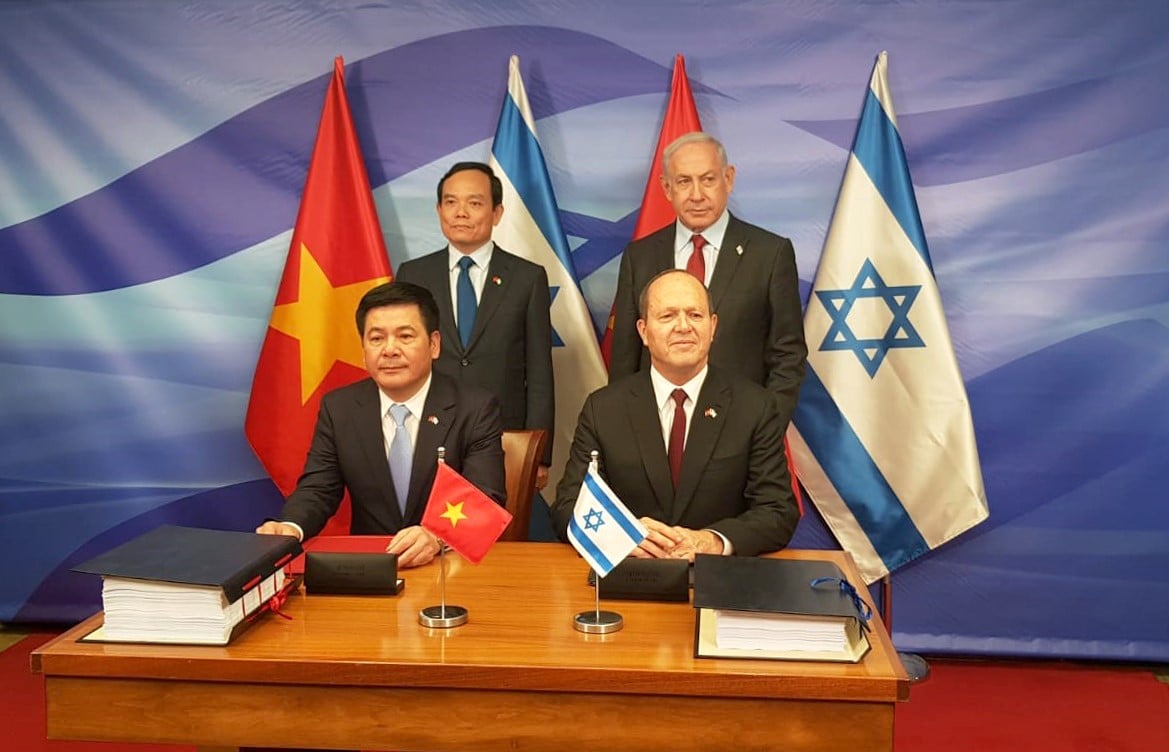November 25, 2025 | 19:17 GMT +7
November 25, 2025 | 19:17 GMT +7
Hotline: 0913.378.918
November 25, 2025 | 19:17 GMT +7
Hotline: 0913.378.918

The two Ministers signed the Vietnam-Israel Free Trade Agreement.
According to the Ministry of Industry and Trade, on July 25, 2023, at the Israeli Prime Minister's Office, in the presence of Israeli Prime Minister Benjamin Netanyahu and Vietnamese Deputy Prime Minister Tran Luu Quang, Vietnamese Minister of Industry and Trade Nguyen Hong Dien and Israeli Minister of Economy and Industry Nir Barkat signed the Vietnam-Israel Free Trade Agreement (VIFTA).
The Vietnam-Israel Free Trade Agreement was started for negotiations in the context that the bilateral relationship between Vietnam and Israel is developing better and better, especially in the fields of economy and trade. The signing of VIFTA marks the result of the tireless efforts of both countries after seven years and 12 negotiation sessions.
Thus, Israel is the first country in West Asia with which Vietnam has signed a Free Trade Agreement (FTA), and Vietnam is also the first country in Southeast Asia that Israel has signed an FTA with.
Israel is currently one of the leading trade, investment, and labor cooperation partners of Vietnam in West Asia. The economic structures of Vietnam and Israel are complementary to each other. The import and export commodities of the two countries not only do not compete directly but also complement each other.
The signing and implementation of VIFTA will create a favorable premise for Vietnam to promote the export of strong commodities to Israel and, at the same time, have the opportunity to access Israel’s high-tech commodities, contributing to reducing production and business costs and improving the competitiveness of Vietnamese goods.
The VIFTA Agreement consists of 15 chapters and several appendices, with basic contents such as trade in goods, services - investment, rules of origin, technical barriers to trade (TBT), sanitary and phytosanitary measures (SPS), customs, trade remedies, government purchases, and legal-institutional framework.
The two sides achieved agreements in all chapters of the agreement, especially the strong commitment of the two sides to raising the rate of trade liberalization. Specifically, Israel commits the overall liberalization rate by the end of the path at 92.7% of tariff lines, and Vietnam commits the rate at 85.8% of tariff lines. With the agreed commitments, the two sides expect that two-way trade will have remarkable growth, soon reaching 3 billion USD and more in the coming time.
Not only contributing to increasing two-way trade turnover, VIFTA is expected to be a lever to help strengthen the cooperation relationship between the two countries in investment, services, digital transformation, technology, etc.
The signing and implementation of VIFTA will create a favorable premise for Vietnam to promote the export of strong commodities not only to Israel but also to other markets in the Middle East, North Africa, and Southern Europe.
In the opposite direction, besides Vietnam's market of over 100 million people, Israel’s goods and technology have the opportunity to access markets in ASEAN countries, Asia-Pacific countries, and major economies in the 16 FTAs that Vietnam has participated in.
In terms of the social aspect, in the near future, on the basis of Israel's special strengths in technology and finance combined with Vietnam's strengths in the investment environment, market size, and the network of 16 FTAs that Vietnam has participated in, VIFTA will bring many opportunities for business cooperation and investment for Israeli enterprises in Vietnam, contributing to creating jobs in areas in which Israel has interests and invests.
Translated by Huyen Vu Thu

(VAN) Deputy Minister Nguyen Quoc Tri emphasized the determination to prevent violations at CoP20, sharing enforcement results and commitments to strengthen cooperation with the international community in the coming period.

(VAN) In addition to strengthening the relationship between schools and enterprises, the Aus4Skills project expands opportunities for female students and people with disabilities to work in the transport and logistics sector.

(VAN) Nghe An is preparing policy, technical, and resource steps to participate in the forest carbon credit market.
/2025/11/25/1648-2-110733_532.jpg)
(VAN) From 2011 to 2023, Ca Mau province lost approximately 6,200 ha of coastal land and protection forests due to erosion, threatening many residential areas, infrastructure facilities, and production zones.

(VAN) Quang Ngai holds strong potential for carbon credits but needs a clear legal and policy framework to secure sustainable revenue from this resource.

(VAN) With its diverse ecosystem, Phu Quoc National Park plays a vital role in environmental protection and biodiversity conservation and serves as the core zone of the Kien Giang World Biosphere Reserve.

(VAN) Cooperation activities under the Aus4Skills program focus on: logistics professional development, competency-based training and assessment (CBTA), leadership innovation, and digitalization.